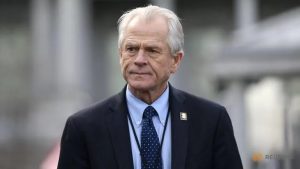
White House trade adviser Peter Navarro, Mar 4, 2019.
WASHINGTON: White House trade adviser Peter Navarro said on Monday (Jun 22) the trade deal with China is “over,” and he linked the breakdown in part to Washington’s anger over Beijing’s not sounding the alarm earlier about the COVID-19 outbreak.
“It’s over,” Navarro told Fox News in an interview when asked about the trade agreement.
He said the “turning point” came when the United States learned about the spreading coronavirus only after a Chinese delegation had left Washington following the signing of the Phase 1 deal on Jan 15.
“It was at a time when they had already sent hundreds of thousands of people to this country to spread that virus, and it was just minutes after wheels up when that plane took off that we began to hear about this pandemic,” Navarro said.
US-China relations have reached their lowest point in years since the coronavirus pandemic that began in China hit the United States hard.
President Donald Trump and his administration repeatedly have accused Beijing of not being transparent about the outbreak.
Financial markets reacted to Navarro’s comments, with US stock futures turning negative and risk-sensitive currencies including the Australian dollar falling.
Later on Monday, Navarro released a statement to say that the trade deal with China “continues in place”, and that his earlier comments about the pact being “over” were taken out of context.
“They had nothing at all to do with the Phase I trade deal, which continues in place. I was simply speaking to the lack of trust we now have of the Chinese Communist Party after they lied about the origins of the China virus and foisted a pandemic upon the world,” he said.
Trump also said in a tweet that the US-China trade deal was fully intact.
“Hopefully they will continue to live up to the terms of the Agreement,” Trump said.
The US-China trade negotiations lasted more than two years, heaped tariffs on US$370 billion of Chinese products, whipsawed financial markets and dented global growth well before the coronavirus outbreak triggered a worldwide recession.
Under the Phase 1 trade deal, China had pledged to boost purchases of US goods by US$200 billion over two years.
But disruptions wrought by the pandemic saw US goods exports to China fall in the first quarter, providing a further challenge to the Trump administration less than five months out from the presidential election.
“We had expected US China tensions to escalate in the second half of this year in the run-up to the US elections,” said Vasu Menon, Senior Investment Strategist, at OCBC Bank Wealth Management in Singapore.
“China hawks … like Navarro could gain the upper hand and egg (Trump) on to take action against China. So expect markets to be very bumpy in second half of this year because of the double whammy from COVID-19 and US-China tensions.”

